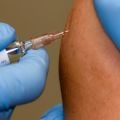New Oxford co-led platform to accelerate COVID-19 tests into real-world use
24 June 2020
Testing for coronavirus infection could become quicker, more convenient and more accurate, following the launch of a multicentre national programme of research that will evaluate how new diagnostic tests perform in hospitals, general practices and care homes.
The COVID-19 National DiagnOstic Research and Evaluation Platform (CONDOR) will create a single national route for evaluating new diagnostic tests in hospitals and in community healthcare settings. The £1.3 million research programme will bringing together experts who are highly experienced in evaluating diagnostic tests and generating the robust evidence required for a test to be used in the NHS.
Co-primary investigator Professor Gail Hayward, Associate Professor at the University of Oxford’s Nuffield Department of Primary Care Health Sciences, and Deputy Director of the NIHR Community Healthcare MedTech and IVD Co-operative, said:
‘Right now, there’s a critical gap in how we road-test new diagnostics for COVID-19. By robustly evaluating these diagnostics in health and care settings, the CONDOR programme will help the government and clinicians to understand the real-world accuracy of these tests in patients presenting with COVID-19 symptoms in the NHS.’
Jointly led by the University of Oxford and the Manchester University NHS Foundation Trust, the programme will put the many tests developed by the life sciences industry to either detect current coronavirus infection or to find out if someone has previously been infected through their paces in hospital, general practice, and care home environments.
Professor Hayward continues:
‘While a new diagnostic test might work well in a lab under controlled conditions, there are many different factors that could make it less accurate when you take that test out of the lab and into the real world.’
‘These include the range of ways that COVID-19 can present itself, from non-symptomatic carriers to post-symptomatic people who have recovered, the range of other illnesses people might have and the challenges of performing tests in a busy clinical environment.’
The research will assess multiple diagnostic tests at once at sites across the country and can be adapted to add in new tests as they become available, and this study is one of a number of COVID-19 studies that have been given urgent public health research status by the Department of Health and Social Care, to expedite its delivery in the health and care system.
At present, the main test currently used to detect coronavirus infection (reverse transcription polymerase chain reaction [RT-PCR]) often involves sending samples away to laboratories, which can take up to 72 hours to provide results.
Lord Bethell, Minister for Innovation at the Department of Health and Social Care, concludes:
‘I’m delighted we’re committing £1.3 million to this brilliant new national research programme to evaluate how new diagnostic tests perform in health and social care settings, so we can track levels of infection and immunity across the country and help keep people safe.’
Contact:
Gavin Hubbard, Communications and Public Engagement Officer, Nuffield Department of Primary Care Health Sciences, University of Oxford.
Email: [email protected]
Notes to editors
The COVID-19 National DiagnOstic Research and Evaluation Platform (CONDOR) is funded by the National Institute for Health Research, UK Research and Innovation, Asthma UK and the British Lung Foundation.
The programme is led by Manchester University NHS Foundation Trust and the University of Oxford, in collaboration with four NIHR Medtech and In vitro diagnostics Co-operatives (MICs) - NIHR Community Healthcare MIC, NIHR Leeds MIC, NIHR London MIC and the NIHR Newcastle MIC - Manchester University NHS Foundation Trust’s Diagnostics and Technology Accelerator (DiTA), the University of Nottingham, Asthma UK and the British Lung Foundation, and the National Measurement Laboratory, hosted at LGC.
About Oxford University
Oxford University has been placed number 1 in the Times Higher Education World University Rankings for the third year running, and at the heart of this success is our ground-breaking research and innovation. Oxford is world-famous for research excellence and home to some of the most talented people from across the globe. Our work helps the lives of millions, solving real-world problems through a huge network of partnerships and collaborations. The breadth and interdisciplinary nature of our research sparks imaginative and inventive insights and solutions.
About the Oxford University Medical Sciences Division
Oxford University’s Medical Sciences Division is one of the largest biomedical research centres in Europe, with over 2,500 people involved in research and more than 2,800 students. The University is rated the best in the world for medicine and life sciences, and it is home to the UK’s top-ranked medical school. It has one of the largest clinical trial portfolios in the UK and great expertise in taking discoveries from the lab into the clinic. Partnerships with the local NHS Trusts enable patients to benefit from close links between medical research and health care delivery.
Within the division, the Nuffield Department of Primary Care Health Sciences is the largest, top-ranked centre for academic primary care in the UK and leads world-class research and training to rethink the way healthcare is delivered in general practice and other community settings. The department’s main research focus is on the prevention, early diagnosis and management of common illness, bringing together academics from many different backgrounds to work together to produce benefits for the NHS, for populations and for patients. www.phc.ox.ac.uk
 New study estimates NHS England spends 3% of its primary and secondary care budget on the health impacts of temperature
New study estimates NHS England spends 3% of its primary and secondary care budget on the health impacts of temperature
 International collaboration launches largest-ever therapeutics trial for patients hospitalised with dengue
International collaboration launches largest-ever therapeutics trial for patients hospitalised with dengue
 Oxford-built multi-agent assistant for cancer care to be piloted in collaboration with Microsoft
Oxford-built multi-agent assistant for cancer care to be piloted in collaboration with Microsoft
 World's first Phase II Nipah virus vaccine trial launch
World's first Phase II Nipah virus vaccine trial launch